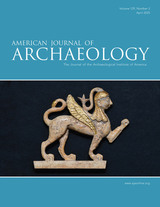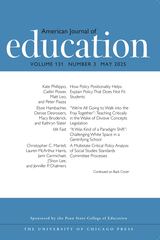10 books about Quignard, Pascal
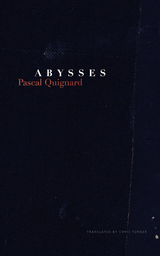
Abysses
Pascal Quignard
Seagull Books, 2015
Prolific essayist, translator, and critic Pascal Quignard has described his Last Kingdom series as something unique. It consists, he says, “neither of philosophical argumentation, nor short learned essays, nor novelistic narration,” but comes, rather, from a phase of his work in which the very concept of genre has been allowed to fall away, leaving an entirely modern, secular, and abnormal vision of the world.
In Abysses, the newest addition to the series, Quignard brings us yet more of his troubling, questing characters—souls who are fascinated by what preceded and conceived them. He writes with a rich mix of anecdote and reflection, aphorism and quotation, offering enigmatic glimpses of the present, and confident, pointed borrowings from the past. But when he raids the murkier corners of the human record, he does so not as a historian but as an antiquarian. Quignard is most interested in the pursuit of those stories that repeat and echo across the seasons in their timelessness.
In Abysses, the newest addition to the series, Quignard brings us yet more of his troubling, questing characters—souls who are fascinated by what preceded and conceived them. He writes with a rich mix of anecdote and reflection, aphorism and quotation, offering enigmatic glimpses of the present, and confident, pointed borrowings from the past. But when he raids the murkier corners of the human record, he does so not as a historian but as an antiquarian. Quignard is most interested in the pursuit of those stories that repeat and echo across the seasons in their timelessness.
[more]

Dying of Thinking
The Last Kingdom IX
Pascal Quignard
Seagull Books, 2023
A deeply contemplative work devoted to thinking from one of the foremost literary figures of contemporary France.
Dying of Thinking is the ninth volume of Pascal Quignard’s Last Kingdom series. It explores three themes: how thought and death coincide, how thought is close to melancholy, and how thought takes shelter near traumatism. One who thinks, Quignard shows us, “compensates” for a very ancient abandonment. Even as a dream is a meaning whose disorderly, condensed, paradoxical images intuit something which has preceded sleep and which returns in them, thought is a meaning which uses words that are written, re-transcribed, dissected, etymologized and neologized. Throughout the Last Kingdom series, Quignard has sought to experience another way of thinking, one that has nothing to do with philosophy, a way of attaching himself “literally” to texts and of progressing by decomposing the imagery of dreams. Dying of Thinking is the heart of this quest.
Dying of Thinking is the ninth volume of Pascal Quignard’s Last Kingdom series. It explores three themes: how thought and death coincide, how thought is close to melancholy, and how thought takes shelter near traumatism. One who thinks, Quignard shows us, “compensates” for a very ancient abandonment. Even as a dream is a meaning whose disorderly, condensed, paradoxical images intuit something which has preceded sleep and which returns in them, thought is a meaning which uses words that are written, re-transcribed, dissected, etymologized and neologized. Throughout the Last Kingdom series, Quignard has sought to experience another way of thinking, one that has nothing to do with philosophy, a way of attaching himself “literally” to texts and of progressing by decomposing the imagery of dreams. Dying of Thinking is the heart of this quest.
[more]
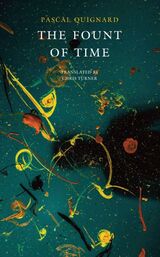
The Fount of Time
The Last Kindom II
Pascal Quignard
Seagull Books, 2021
“Last Kingdom is a set of books that . . . is neither philosophical argumentation nor little disparate, scholarly essays, nor novelistic narrative; gradually, for me, all genres have fallen away.”
So writes Pascal Quignard of his monumental book series, Last Kingdom. In the latest volume, The Fount of Time, he focuses on the paradoxically immediate presence in our lives of the deepest, most distant past. He explores this subject through a multitude of mediums: fragments of autobiography; curious folktales; literary snippets; historical anecdotes both classical and modern; ruminations on biology, archaeology, and linguistics. Using all of these forms, he confronts dimensions of human experience which, though customarily conveyed in legend, myth, and dreams, run somehow beneath the everyday world and yet are part of our most tangible reality.
To enter Quignard’s horizonless time-space is to embrace a rich vision in which the totality of human history and culture is placed disconcertingly on a single footing. In The Fount of Time we are able to glimpse—whether through obscure cultural detail or unusual anecdote—“another world beneath the world.”
So writes Pascal Quignard of his monumental book series, Last Kingdom. In the latest volume, The Fount of Time, he focuses on the paradoxically immediate presence in our lives of the deepest, most distant past. He explores this subject through a multitude of mediums: fragments of autobiography; curious folktales; literary snippets; historical anecdotes both classical and modern; ruminations on biology, archaeology, and linguistics. Using all of these forms, he confronts dimensions of human experience which, though customarily conveyed in legend, myth, and dreams, run somehow beneath the everyday world and yet are part of our most tangible reality.
To enter Quignard’s horizonless time-space is to embrace a rich vision in which the totality of human history and culture is placed disconcertingly on a single footing. In The Fount of Time we are able to glimpse—whether through obscure cultural detail or unusual anecdote—“another world beneath the world.”
[more]
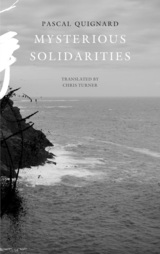
Mysterious Solidarities
Pascal Quignard
Seagull Books, 2020
When translator Claire Methuen travels back to her hometown of Dinard for a family wedding, she runs into her old piano teacher Madame Ladon. After befriending the ageing woman, Methuen begins to toy with the idea of a permanent return to live in Brittany. She becomes increasingly obsessed by her childhood sweetheart, Simon Quelen, who, now married and a father, still lives in a village further down the coast where he is the local pharmacist and mayor. Having moved into a farmhouse, she soon spends her days walking the heathland above the cliffs and spying on him as he sails in the bay. As she walks, she is at one with the land of her childhood and youth, “her skull emptying into the landscape.” And when her younger brother Paul comes to join her there, the web of solidarities is further enriched.
This is a tale of dramatic episodes, told through intermingling voices and the atmospherics of the austere Breton landscape. Ultimately, it is a story of obsessional love and of a parallel sibling bond that is equally strong.
This is a tale of dramatic episodes, told through intermingling voices and the atmospherics of the austere Breton landscape. Ultimately, it is a story of obsessional love and of a parallel sibling bond that is equally strong.
[more]

The Paradisiacs
Last Kingdom IV
Pascal Quignard
Seagull Books, 2025
Pascal Quignard delves into the uncanny bond between recognition and loss, outlining how our earliest experiences shape our longing for a paradise we can never reclaim.
What if paradise was not a place we lost, but one we never truly knew? In Paradisiacs, the fourth volume of the Last Kingdom series, Pascal Quignard meditates on the nature of paradise—not as an Eden to which we might return, but as a place of origin that lingers in myth. Through his signature blend of ancient texts, Paleolithic art, psychoanalysis, and personal reflection, Quignard explores our primal longing for recognition. He traces this yearning back to the erstwhile, a prenatal paradise from which we are expelled at birth, and examines how resemblance and recognition shape our identities.
At once poetic and philosophical, Paradisiacs invites readers into Quignard’s singular world, where language and history coalesce into a profound rumination on the origins of selfhood. With John Taylor’s masterly translation, this latest installment of Last Kingdom is a hypnotic and revelatory reading experience for those drawn to the intersections of philosophy and the ineffable.
What if paradise was not a place we lost, but one we never truly knew? In Paradisiacs, the fourth volume of the Last Kingdom series, Pascal Quignard meditates on the nature of paradise—not as an Eden to which we might return, but as a place of origin that lingers in myth. Through his signature blend of ancient texts, Paleolithic art, psychoanalysis, and personal reflection, Quignard explores our primal longing for recognition. He traces this yearning back to the erstwhile, a prenatal paradise from which we are expelled at birth, and examines how resemblance and recognition shape our identities.
At once poetic and philosophical, Paradisiacs invites readers into Quignard’s singular world, where language and history coalesce into a profound rumination on the origins of selfhood. With John Taylor’s masterly translation, this latest installment of Last Kingdom is a hypnotic and revelatory reading experience for those drawn to the intersections of philosophy and the ineffable.
[more]
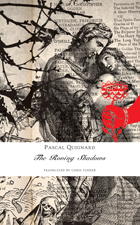
The Roving Shadows
Pascal Quignard
Seagull Books, 2011
There are few if any voices more distinct in contemporary French literature than that of Pascal Quignard, a prolific writer of rare erudition and elegance. Essayist, critic, translator, novelist and musician, Quignard attempts here an ambitious amalgam of his many artistic styles in a fragmentary work that defies the idea of genre. And his daring was rewarded in 2002 when The Roving Shadows became the first non-novel in more than sixty years to win the Goncourt Prize, France’s most prestigious literary award.
The first book in Quignard’s Last Kingdom series, The Roving Shadows can be read as a long meditation on reading and writing that strives to situate these otherwise innocuous activities in a profound relationship to sex and death. Writing and reading can in fact be linked to our animal natures and artistic strivings, to primal forces and culturally persistent fascinations. With dexterity and inventiveness, Quignard weaves together historical anecdotes, folktales from the East and West, fragments of myth, and speculative historical reconstructions. The whole, written in a musical style not far removed from that of Couperin, whose piano composition Les Ombres errantes lends the book its title, coheres into a work of literature that reverberates in the psyche long after one has laid it down.
The Roving Shadows is a rare and wondrous tour de force that cements Quignard’s reputation in contemporary world literature. Available now for the first time in English, this boldly adventurous work will find a new and welcoming audience.
[more]

The Silent Crossing
Pascal Quignard
Seagull Books, 2013
A haunting homage to life and liberty, to society and solitude, and to the binding and unbinding that constitute the weft of our lives.
Drawing on materials from across many cultures, Pascal Quignard makes an effort to establish shared human values as the breeding ground for a modern Enlightenment. Considering atheism as a spiritual liberation, suicide as a free act, and the rejection of society as a free choice, the author explores philosophical themes that have run through human civilizations—most often as heresies—from our earliest days. In his search for freedom, Quignard questions the binding dependency of religion, querying how, in a world where all forms of society presuppose that someone (or some collective) is looking over our shoulders, we can be free. These reflections, he implies, are the essential spiritual exercise for our times.
Few voices in contemporary French literature are more distinct than that of Quignard. By reading this fragmentary, episodic assemblage of intimate experiences and borrowed tales, we open up a space of liberty, creating for the reader space for meditation and, perhaps, liberation.
[more]

The Tears
Pascal Quignard
Seagull Books, 2023
A novel of intersecting historical threads.
The Tears is, at one level, a novel about the turbulent lives of twins, the sons of Charlemagne’s daughter Bertha. The studious and scholarly Nithard succeeds his father Angilbert as lay abbot of the Abbey of Saint Riquier in Normandy and accompanies his cousin the emperor Charles the Bald on his military campaigns. His twin brother Hartnid strikes out boldly for more exotic parts—including, eventually, Baghdad—in a seemingly deranged quest to track down the elusive female face that haunts his dreams. Yet this novel of intersecting historical threads and patches of poetic reimagining is crisscrossed by a host of other themes: the enigmatic joys afforded by nature, the intimate relation between living creatures which literature has since earliest times depicted, and the mysterious power of contingent events that have shaped entire cultures—including the birth of the French language itself. This heady brew of medieval chronicle, miraculous folktale, and speculative reconstruction of history further strengthens Pascal Quignard’s status as one of France’s most imaginative contemporary writers.
The Tears is, at one level, a novel about the turbulent lives of twins, the sons of Charlemagne’s daughter Bertha. The studious and scholarly Nithard succeeds his father Angilbert as lay abbot of the Abbey of Saint Riquier in Normandy and accompanies his cousin the emperor Charles the Bald on his military campaigns. His twin brother Hartnid strikes out boldly for more exotic parts—including, eventually, Baghdad—in a seemingly deranged quest to track down the elusive female face that haunts his dreams. Yet this novel of intersecting historical threads and patches of poetic reimagining is crisscrossed by a host of other themes: the enigmatic joys afforded by nature, the intimate relation between living creatures which literature has since earliest times depicted, and the mysterious power of contingent events that have shaped entire cultures—including the birth of the French language itself. This heady brew of medieval chronicle, miraculous folktale, and speculative reconstruction of history further strengthens Pascal Quignard’s status as one of France’s most imaginative contemporary writers.
[more]
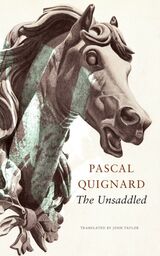
The Unsaddled
Pascal Quignard
Seagull Books, 2023
A captivating and wide-ranging interpretation of accidental dismounting.
In Pascal Quignard’s writing, philology hunts for wild game in a dark forest. The Unsaddled, which features horses as its central figure, is no exception. Taking off from puns, multifarious imagery, and metaphorical meanings—“to be baffled,” “to be thrown”—that the book’s title provides, Quignard focuses on life-changing moments. We meet George Sand (whose father died after being thrown from his horse), Saint Paul, Abelard, Agrippa d’Aubigné, and countless other writers, philosophers, theologians, or kings who fell off their horses—not to forget Jean-Jacques Rousseau, who was knocked over by a dog. Being “unsaddled” can also be associated, as Quignard shows in regard to Nietzsche, with an “overturning” of values. Scenes of war, hunting, “fleeing” or sexuality—“When lovers have a horse ride, they gallop in another world”—come before our eyes, each time from those unsettling vantage points that Quignard knows how to find. As ever, he ranges far and wide in his intense quest, taking examples from across human history, from the neolithic age to his own childhood memories of postwar Le Havre in northern France.
In Pascal Quignard’s writing, philology hunts for wild game in a dark forest. The Unsaddled, which features horses as its central figure, is no exception. Taking off from puns, multifarious imagery, and metaphorical meanings—“to be baffled,” “to be thrown”—that the book’s title provides, Quignard focuses on life-changing moments. We meet George Sand (whose father died after being thrown from his horse), Saint Paul, Abelard, Agrippa d’Aubigné, and countless other writers, philosophers, theologians, or kings who fell off their horses—not to forget Jean-Jacques Rousseau, who was knocked over by a dog. Being “unsaddled” can also be associated, as Quignard shows in regard to Nietzsche, with an “overturning” of values. Scenes of war, hunting, “fleeing” or sexuality—“When lovers have a horse ride, they gallop in another world”—come before our eyes, each time from those unsettling vantage points that Quignard knows how to find. As ever, he ranges far and wide in his intense quest, taking examples from across human history, from the neolithic age to his own childhood memories of postwar Le Havre in northern France.
[more]
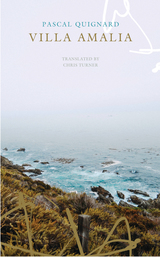
Villa Amalia
Pascal Quignard
Seagull Books, 2018
Musician Ann Hidden suspects her partner, Thomas, isn’t telling her everything. So one dark night, she secretly follows him to an unfamiliar house in the Paris suburbs, where he disappears inside with an unknown woman. But before she can even begin to process what looks like a betrayal, she gets another surprise—an old schoolmate, Georges Roehlinger, appears, berating her for spying the from the bushes.
With Georges’s help, Ann takes radical action: while Thomas is away, she resolves to secretly sell their shared house and get rid of all the physical manifestations of their sixteen years together. Thomas returns to find her gone, the locks changed, and his few possessions packed up and sent to his office. Ann, meanwhile, has fled the country and started a new, hidden life. But our past is never that easy to escape, and Ann’s secrets eventually seek her out.
With Georges’s help, Ann takes radical action: while Thomas is away, she resolves to secretly sell their shared house and get rid of all the physical manifestations of their sixteen years together. Thomas returns to find her gone, the locks changed, and his few possessions packed up and sent to his office. Ann, meanwhile, has fled the country and started a new, hidden life. But our past is never that easy to escape, and Ann’s secrets eventually seek her out.
[more]
READERS
Browse our collection.
PUBLISHERS
See BiblioVault's publisher services.
STUDENT SERVICES
Files for college accessibility offices.
UChicago Accessibility Resources
home | accessibility | search | about | contact us
BiblioVault ® 2001 - 2025
The University of Chicago Press




